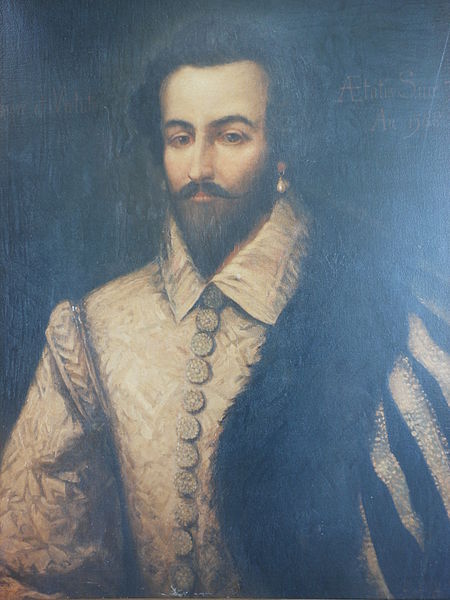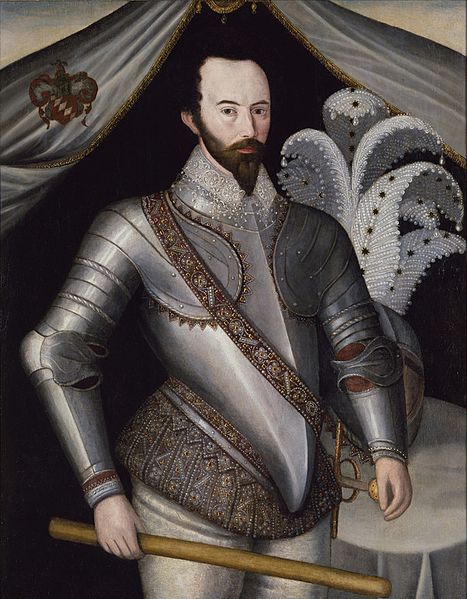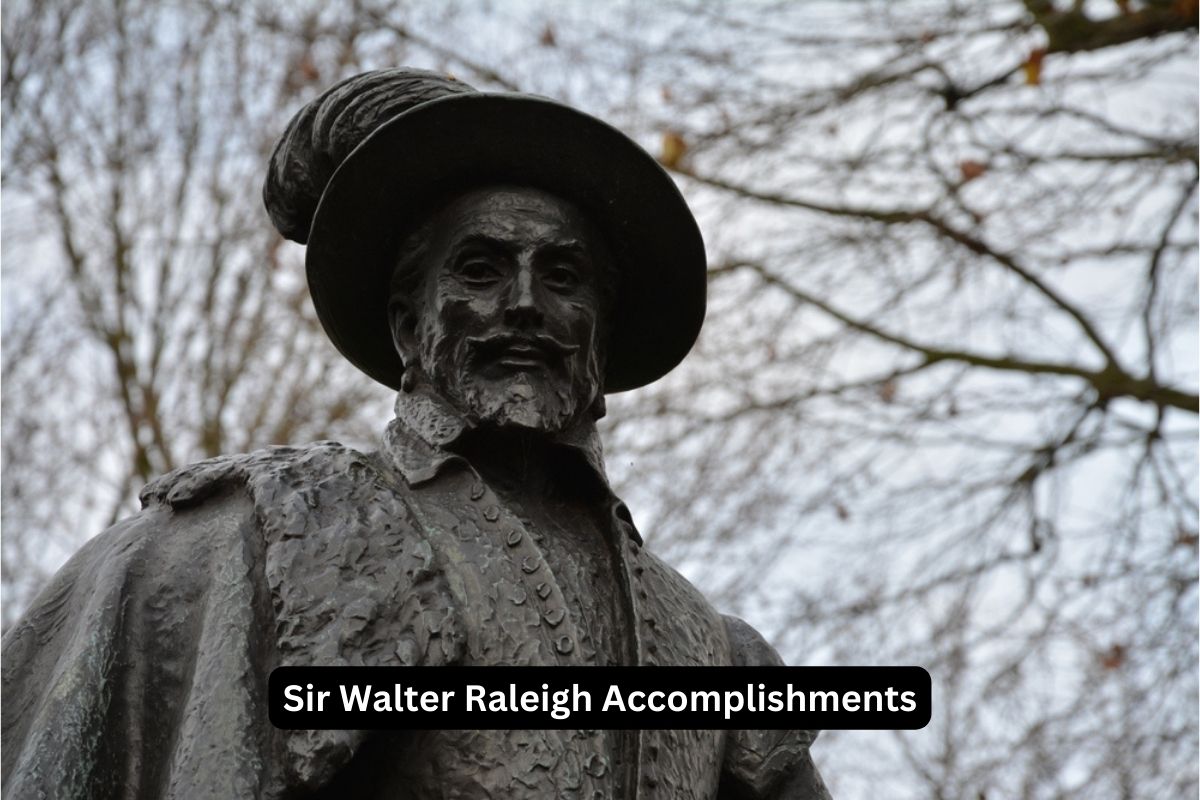Sir Walter Raleigh (c. 1552 – 1618) was an English explorer, soldier, poet, and courtier during the Elizabethan era.
He is best known for his exploration of the New World, including attempts to establish the Roanoke Island colony in what is now North Carolina.
Raleigh introduced potatoes and tobacco to Europe and played a key role in popularizing tobacco in England. He served Queen Elizabeth I as Captain of the Queen’s Guard, was a member of the Privy Council, and made significant contributions to the English navy.
Raleigh was also a prolific writer and poet. Later in life, he faced imprisonment for treason and was eventually executed in 1618. His life and accomplishments continue to be a subject of historical fascination and study.
Accomplishments of Sir Walter Raleigh
1. Exploration of the New World
Sir Walter Raleigh was a prominent figure in the Age of Exploration during the late 16th century. He sponsored and organized several voyages to the New World, which was an exciting and largely uncharted frontier at the time.
Also Read: Facts About Sir Walter Raleigh
Raleigh sent an expedition led by Philip Amadas and Arthur Barlowe to explore the eastern coast of North America, specifically the region of present-day North Carolina. They returned with positive reports about the land, which encouraged further exploration.

2. Roanoke Island Colonization attempts
Raleigh’s most significant achievement in exploration was his attempt to establish a permanent English colony on Roanoke Island in North America in 1585.
Also Read: Timeline of Sir Walter Raleigh
This marked one of the earliest efforts to establish a European settlement in the New World, predating the Plymouth Colony by several decades.
Although the colony ultimately failed and became known as the “Lost Colony,” it laid the groundwork for future English colonization efforts.
3. Introduction of potatoes and tobacco to Europe
Sir Walter Raleigh is credited with introducing two important crops to Europe:
- Potatoes: During his expeditions to the New World, Raleigh encountered the potato, which was a staple crop of the indigenous people. He brought the potato back to Europe, where it would eventually become a vital food source due to its high nutritional value and adaptability to various climates.
- Tobacco: Raleigh is also known for popularizing tobacco smoking in England. He learned of tobacco use from indigenous peoples in the Americas and introduced it to England’s elite society. This introduction had a significant impact on European culture and commerce, as tobacco became a highly sought-after commodity.
4. Popularization of tobacco in England
Sir Walter Raleigh played a pivotal role in promoting the use of tobacco in England, which had lasting effects on European society.
Raleigh himself became a tobacco enthusiast, and he is often depicted in historical illustrations with a pipe. His endorsement of tobacco helped create a trend among English nobility and the upper class, leading to the widespread adoption of tobacco smoking.
The cultivation of tobacco in England and its trade with the New World contributed to the growth of the English economy and laid the foundation for the tobacco industry in later centuries.
5. Literary contributions, including poetry
In addition to his exploration and military achievements, Sir Walter Raleigh was a renowned writer and poet. His literary contributions included:
- Poetry: Raleigh is best known for his poetry, and he wrote several celebrated poems during the Elizabethan era. His poems, such as “The Nymph’s Reply to the Shepherd” and “The Passionate Shepherd to His Love,” continue to be studied and appreciated for their lyrical beauty and thematic depth.
- Historical Works: Raleigh also wrote historical works, including “The History of the World,” which aimed to provide a comprehensive account of world history up to his time. This ambitious project showcased his intellectual and literary abilities.

6. Service to Queen Elizabeth I
Sir Walter Raleigh was a trusted and influential figure in the court of Queen Elizabeth I. His service to the queen included:
Appointment as Captain of the Queen’s Guard: Raleigh was appointed as the Captain of the Queen’s Guard in 1587, which was a prestigious position that put him in close proximity to Queen Elizabeth I. This role highlighted his stature and importance in her court.
Member of the Privy Council: Raleigh was also appointed to the Privy Council, a group of advisors to the queen. This position gave him direct access to the queen and allowed him to participate in important political and policy decisions of the time.
Favor and Patronage: Raleigh enjoyed the queen’s favor and patronage, which allowed him to pursue his various ventures, including exploration and colonization in the New World.
7. Military achievements in Ireland and against the Spanish Armada
Sir Walter Raleigh had a distinguished military career, and he played a significant role in various military campaigns:
Service in Ireland: Raleigh served in the English military campaign in Ireland during the late 16th century. His military prowess and leadership abilities were evident during this time, and he was known for his efforts in suppressing Irish uprisings.
Defense against the Spanish Armada (1588): Raleigh played a crucial role in defending England against the Spanish Armada in 1588. He was part of the naval forces that engaged the Spanish fleet, contributing to the English victory and the defense of England against Spanish invasion.
8. Expeditions to South America in search of El Dorado
Sir Walter Raleigh embarked on expeditions to South America in search of the legendary city of El Dorado, often associated with vast riches. These journeys were significant:
- First Expedition (1595): Raleigh’s first expedition to South America aimed to find the city of El Dorado. Although he didn’t locate the fabled city, his exploration contributed to European knowledge of the region’s geography and native cultures.
- Second Expedition (1617): Raleigh’s second expedition to South America occurred years later, after his release from imprisonment. This expedition was ill-fated, as Raleigh’s forces clashed with the Spanish, leading to hostilities and ultimately Raleigh’s capture by Spanish authorities.
9. Contribution to the development of the English navy
Raleigh played a role in the development and strengthening of the English navy during his lifetime:
Ship Design and Innovation: He contributed to the design and construction of warships, making them more efficient and powerful. His expertise in naval matters was valuable in the defense of England against external threats, such as the Spanish Armada.
Promotion of Naval Expansion: Raleigh recognized the strategic importance of a strong navy in maintaining England’s security and global influence. His support for naval expansion helped pave the way for the later growth of the English navy as a dominant maritime power.
10. Imprisonment and execution for treason
Unfortunately, Sir Walter Raleigh’s later years were marked by personal and political turmoil:
Imprisonment for Treason (1603): Raleigh fell out of favor with King James I after the death of Queen Elizabeth I. He was accused of plotting against the king and imprisoned in the Tower of London for over a decade.
Release and Ill-Fated Expedition (1617): Raleigh was released from imprisonment in 1616 and sought to mount a final expedition to South America. This expedition, intended to find El Dorado, ended disastrously, with Raleigh’s men attacking a Spanish outpost. Upon his return to England, he was arrested and condemned to death for violating the terms of peace with Spain.
Execution (1618): Sir Walter Raleigh was executed by beheading in October 1618. His death marked the end of a remarkable life filled with exploration, military service, and literary contributions. Despite his accomplishments, he met a tragic end as a result of political circumstances.
